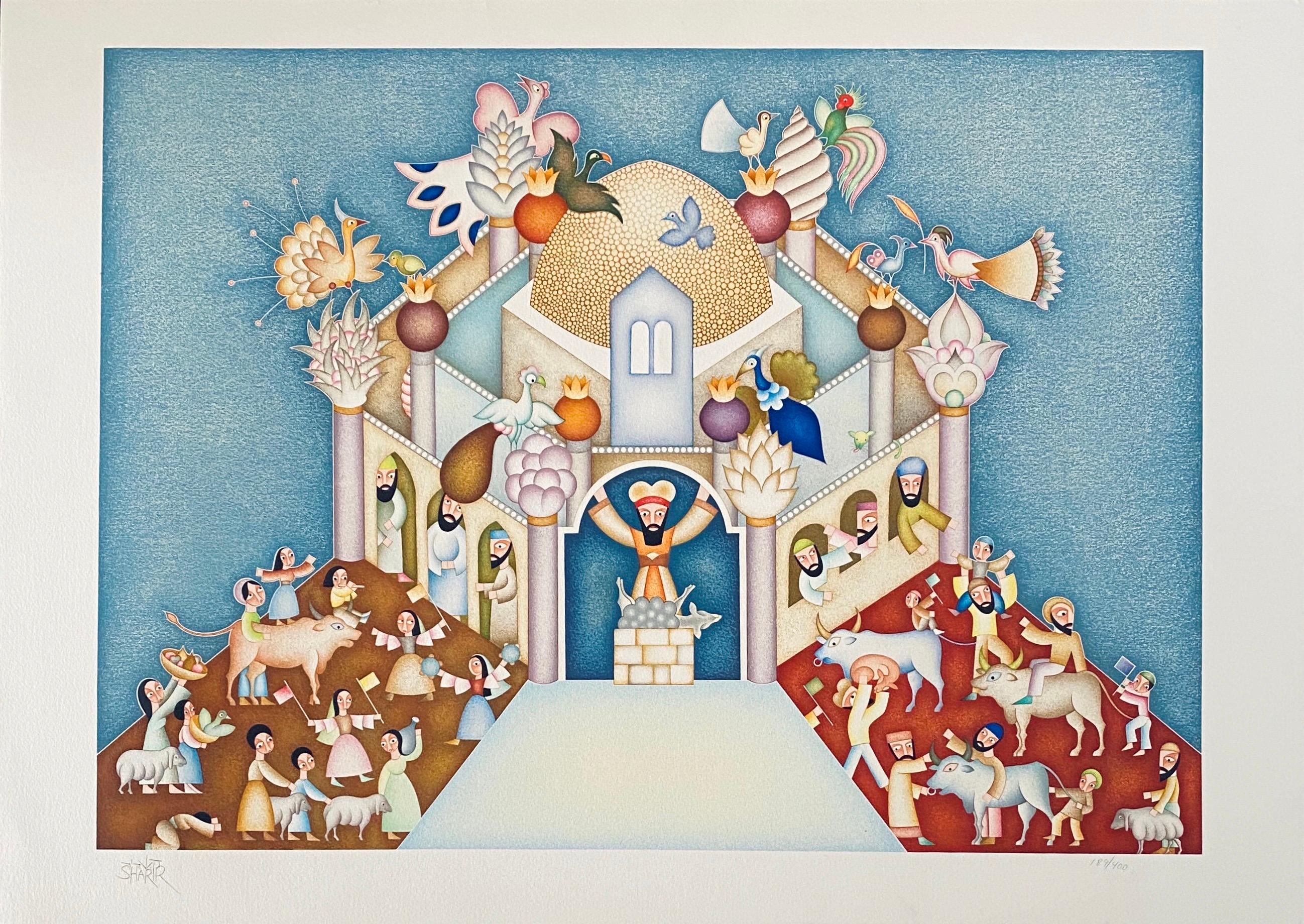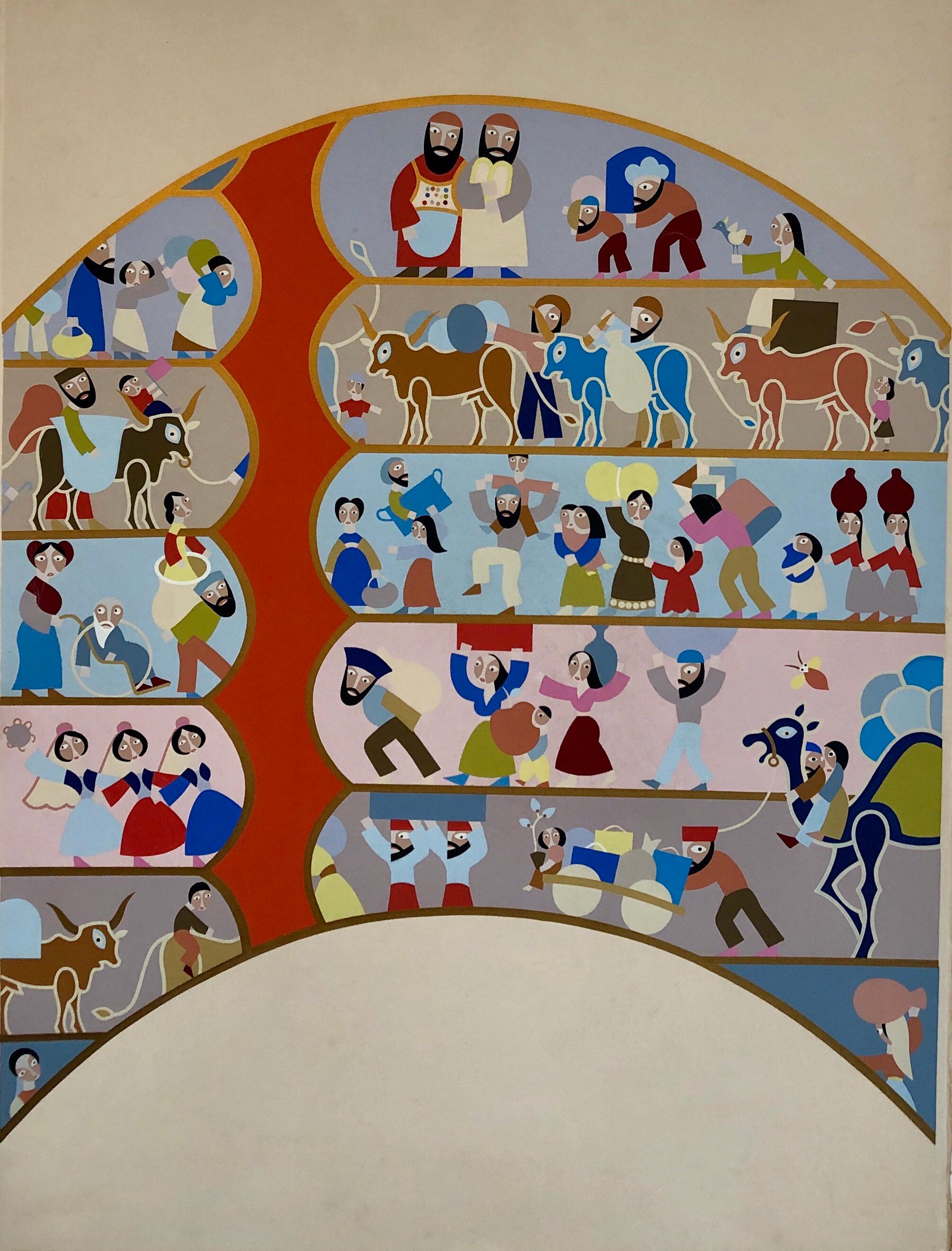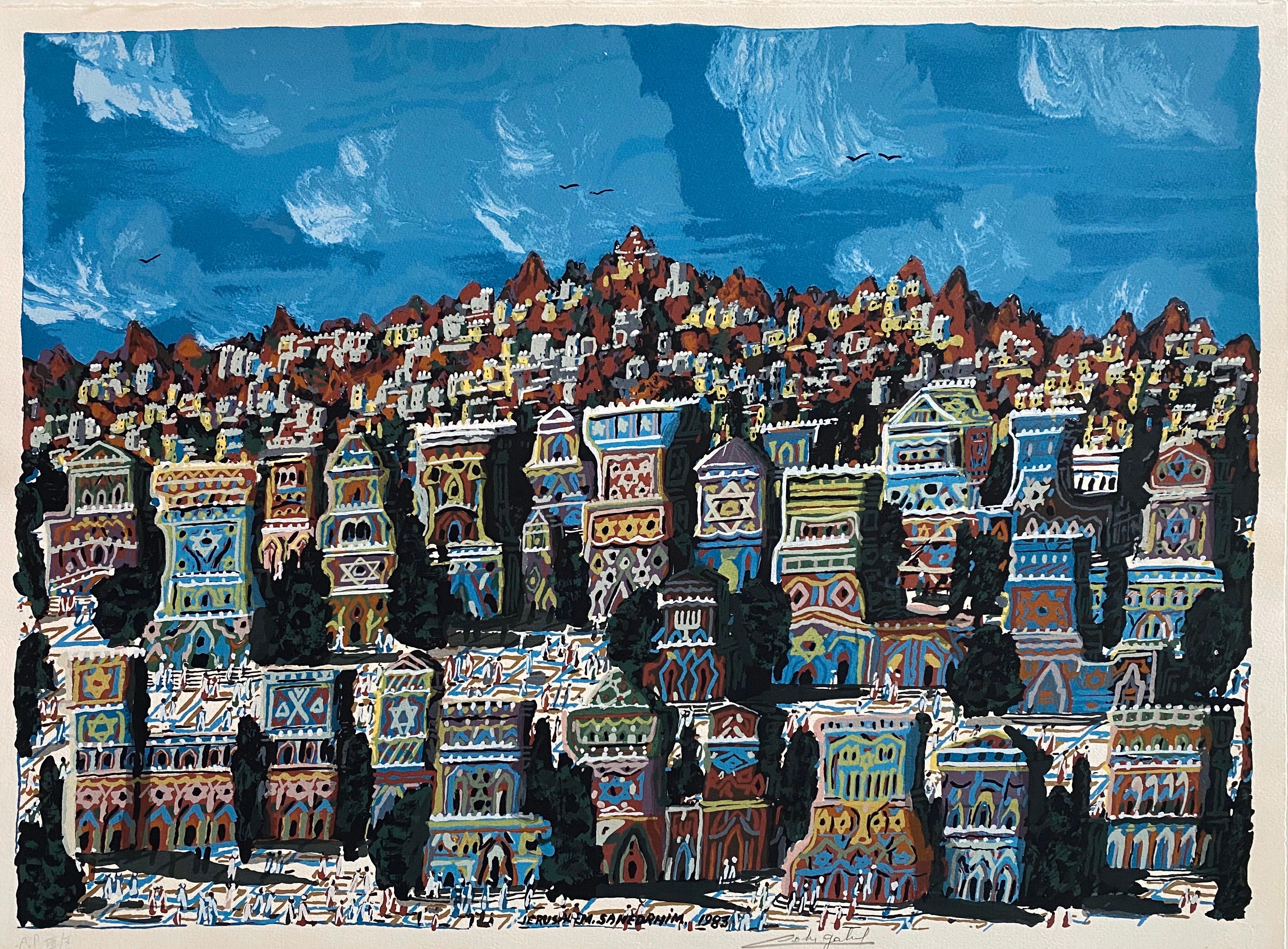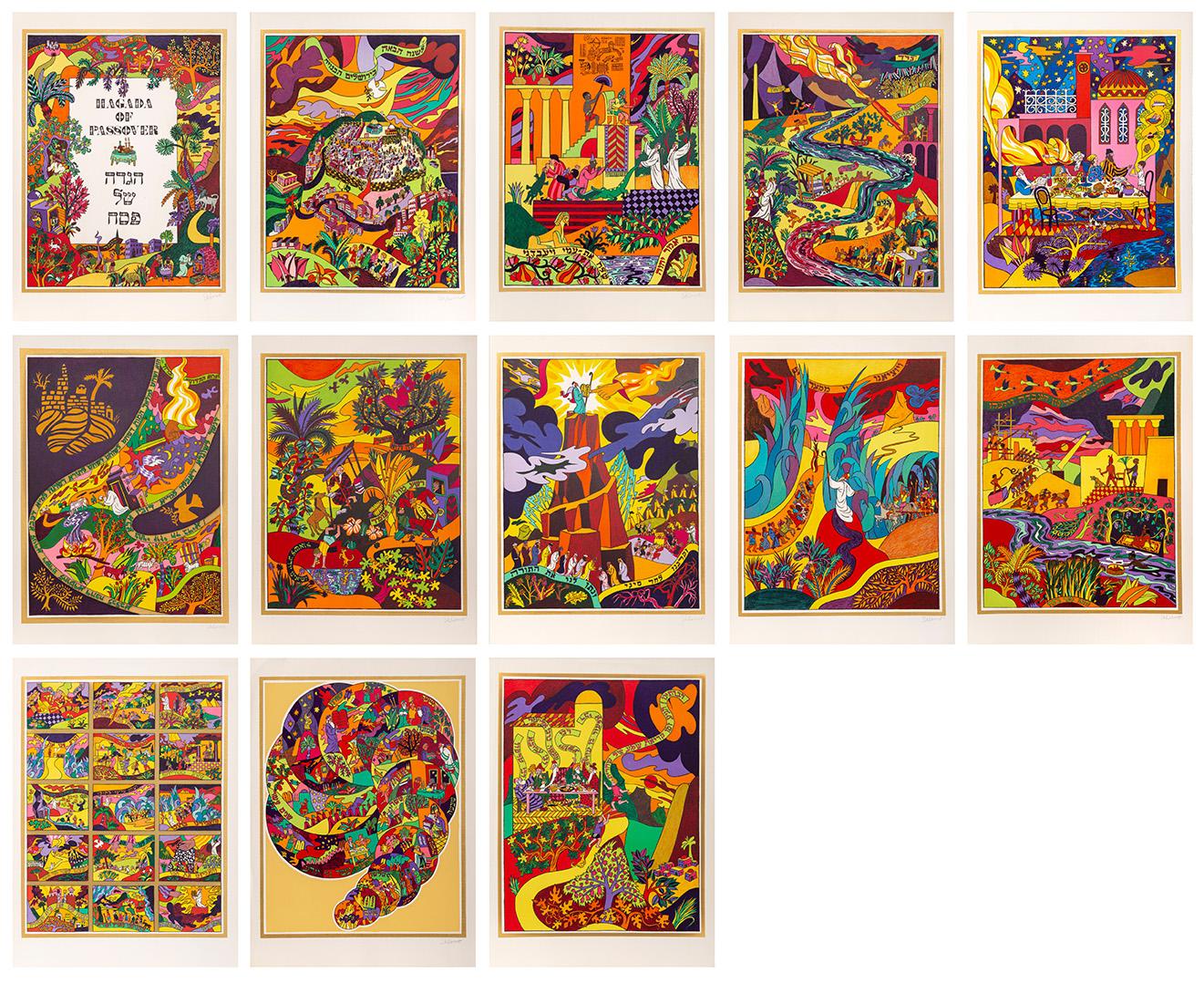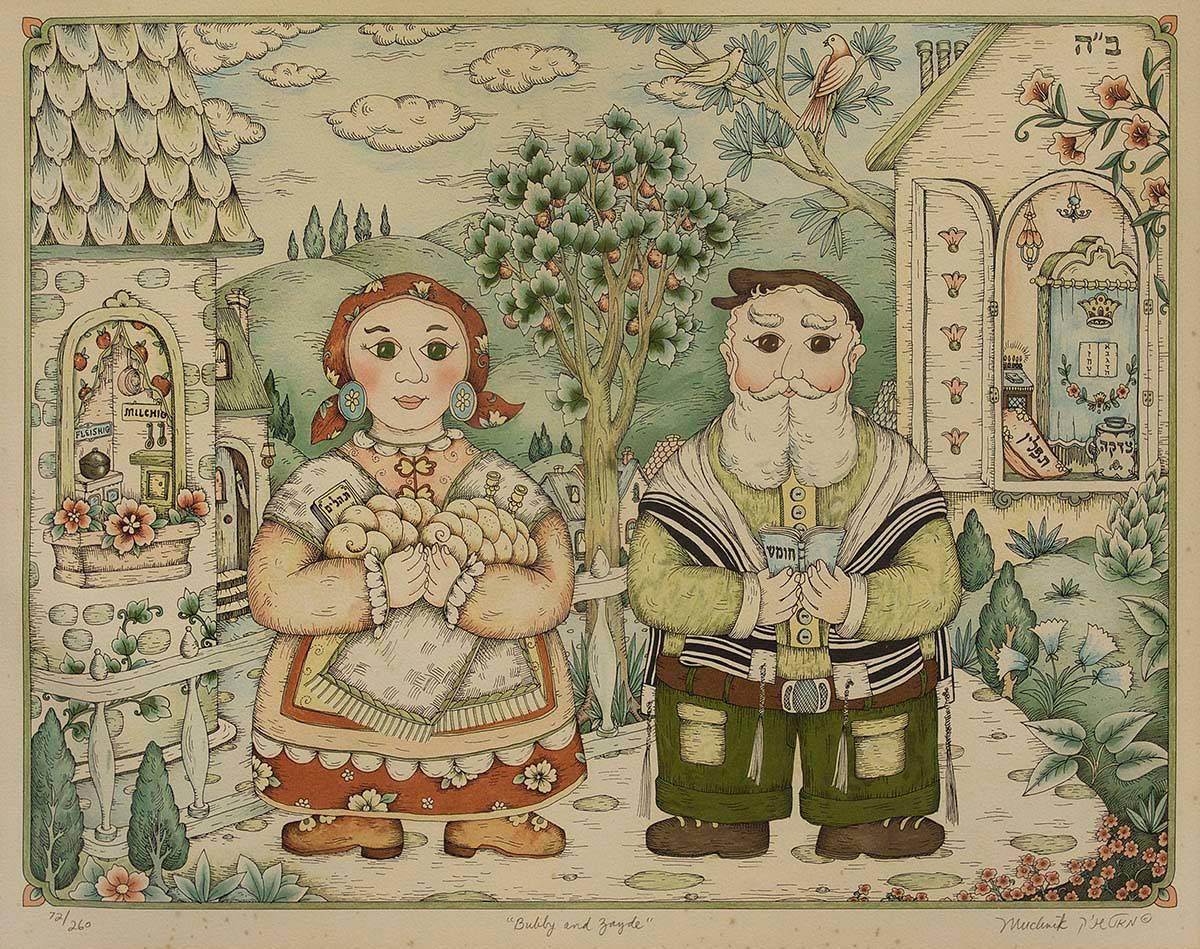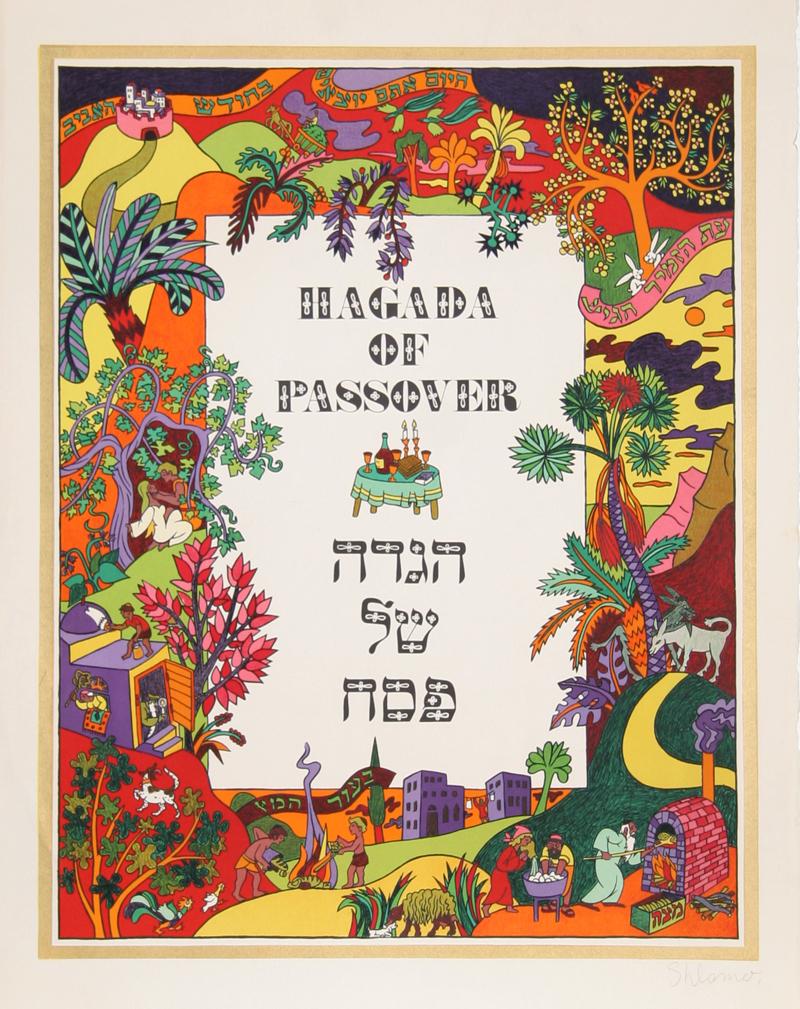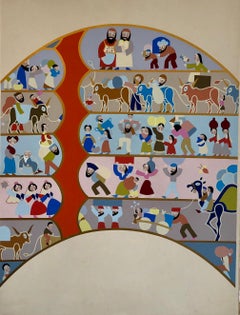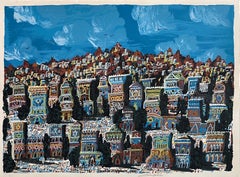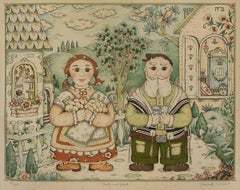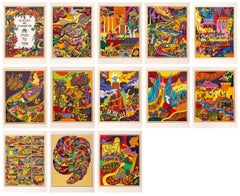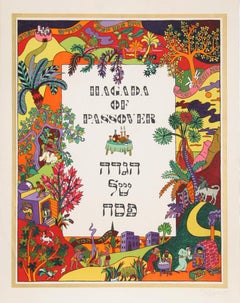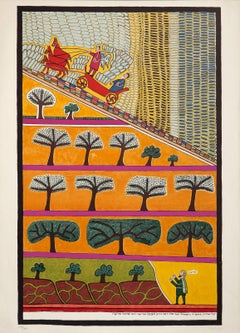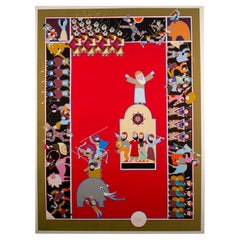Items Similar to Israeli Folk Art Hebrew Naive Judaica Lithograph Jewish Holiday Shavuot
Want more images or videos?
Request additional images or videos from the seller
1 of 13
Shalom MoskovitzIsraeli Folk Art Hebrew Naive Judaica Lithograph Jewish Holiday Shavuot
$1,250
£942.62
€1,090.19
CA$1,753.74
A$1,949.39
CHF 1,021.83
MX$23,806.83
NOK 12,756.97
SEK 12,001.93
DKK 8,136.86
About the Item
Vintage pencil signed and numbered limited edition lithograph on deckle edged Arches paper.
Shalom of Sefad (Shulem der Zeigermacher in Yiddish Shalom Moskowitz) Shalom of Tzfat lived for over seventeen years in his native town of Safed in the hills of the Galilee. There he worked as a watchmaker, stonemason and silversmith, during the 50's. Since then this self-taught artist has achieved an international reputation. Shalom is a naive painter, but not a rustic one, he expresses a very elaborate way of thinking in his own way. While belonging to Hasidism, Shalom of Safed uses his artistic talents positively. 'I don't paint', he explains, 'to tell the story of the Bible in color and lines. His works have been exhibited in prominent museums and galleries in Europe and the United States, and are included in the collections of the Museums of Modern Art in Paris and New York, the Israel Museum in Jerusalem, the Stedelijk Museum in Amsterdam, the Modern Museum in Stockholm and the Jewish Museum in New York
He has exhibited alongside all of the Israeli great artists. Israel has had a Vibrant Folk Art, Naive art scene for a long time now artists like Yisrael Paldi, Nahum Guttman, Reuven Rubin and even Yefim Ladizhinsky had naive periods. The most well know if the strict naive artists are Shalom of Safed, Irene Awret Gabriel Cohen, Natan Heber, Michael Falk and Kopel Gurwin.
- Creator:Shalom Moskovitz (1895 - 1980, Israeli)
- Dimensions:Height: 22 in (55.88 cm)Width: 29.75 in (75.57 cm)
- Medium:
- Movement & Style:
- Period:
- Condition:minor wear.
- Gallery Location:Surfside, FL
- Reference Number:1stDibs: LU38213618692
About the Seller
4.9
Platinum Seller
Premium sellers with a 4.7+ rating and 24-hour response times
Established in 1995
1stDibs seller since 2014
1,799 sales on 1stDibs
Typical response time: <1 hour
- ShippingRetrieving quote...Shipping from: Surfside, FL
- Return Policy
Authenticity Guarantee
In the unlikely event there’s an issue with an item’s authenticity, contact us within 1 year for a full refund. DetailsMoney-Back Guarantee
If your item is not as described, is damaged in transit, or does not arrive, contact us within 7 days for a full refund. Details24-Hour Cancellation
You have a 24-hour grace period in which to reconsider your purchase, with no questions asked.Vetted Professional Sellers
Our world-class sellers must adhere to strict standards for service and quality, maintaining the integrity of our listings.Price-Match Guarantee
If you find that a seller listed the same item for a lower price elsewhere, we’ll match it.Trusted Global Delivery
Our best-in-class carrier network provides specialized shipping options worldwide, including custom delivery.More From This Seller
View AllIsraeli Naive Folk Art Silkscreen Lithograph David Sharir - Bet Hamikdash Scene
By David Sharir
Located in Surfside, FL
David Sharir was born in 1938 in Tel Aviv, Israel and currently resides there.
David Sharir, the son of Russian immigrants, was born in Israel. Beginning his study of art in Tel Aviv...
Category
20th Century Folk Art Figurative Prints
Materials
Screen
Israeli Modern Passover Lithograph Silkscreen David Sharir Holiday Art Serigraph
By David Sharir
Located in Surfside, FL
This is a mixed lithograph and serigraph silkscreen as per descriptions i read. this is not signed or numbered. it is a rare artists or printers proof print. It depicts Moses and Aaron at the top and I believe it relates to Passover and the exodus from Egypt.
David Sharir was born in 1938 in Tel Aviv, Israel and currently resides there.
David Sharir, the son of Russian immigrants, was born in Israel. Beginning his study of art in Tel Aviv and continuing in Florence and Rome, where he studied architecture and theater design. The brightly colored costumes and intricate stage designs he created for these productions have profoundly influenced his art. When Sharir moved to Jaffa in 1966, his hallmark style was truly developed. Studio, family, and spiritual devotion all serve as inspiration for the imagery in his work. His evolving style combines personal experience, Biblical symbolism, and fantasy.
David Sharir, born 1938, Tel Aviv. Was among the first artists to settle in Old Jaffa in 1966. He depicted biblical subjects with a touch of humour and designed sets and costumes for the theatre and opera.
Graphic Art in Israel Today Tel Aviv Museum, Tel Aviv 1973
Israel 1948-1958: Watercolors, Drawings, Graphics
The Bezalel National Museum, Jerusalem 1958
Jean David, Yosl Bergner, Menachem Shemi, Zvi Mairovich, Ruth Schloss, Nahum Gutman, Moshe Elazar Castel...
Category
20th Century Contemporary Figurative Prints
Materials
Lithograph
Israeli Naive Art Screen Print Lithograph Jerusalem, Sanhedrin Old City Folk Art
By Gabriel Cohen
Located in Surfside, FL
Bold color lithograph, hand signed in pencil and numbered AP IX/X (artist’s proof 9/10), Jerusalem Print Workshop blind stamp lower right. On French Arches paper.
Gabriel Cohen, Sel...
Category
20th Century Folk Art Landscape Prints
Materials
Lithograph, Screen
Bubby and Zayde, Judaica Folk Art Jewish Lithograph
By Michoel Muchnik
Located in Surfside, FL
The title of the piece makes reference to the subject of the piece, in this case Bubby (Grandmother in Yiddish) and Zayde (Grandfather in Yiddish). In terms of style, it looks illustrative, cartoonist, and fairy-tale like. Edition 76/260.
Michoel Muchnik was born in Philadelphia in 1952. Muchnik received his artistic training at the Rhode Island School of Design. He later studied Jewish and Talmudic studies at the Rabbinical College of America in Morristown, New Jersey.
Michoel Muchnik's art focuses on imaginative and joyful depictions of traditional and mystical Jewish and Hasidic themes. Muchnik has exhibited his work and lectured on Hasidic art throughout the United States as well as abroad. In 1977, Muchnik was selected alongside four other Hasidic artists, including Hendel Lieberman...
Category
Late 20th Century Folk Art Figurative Prints
Materials
Lithograph
Large French Judaica Lithograph Colorful Jewish Wedding Hebrew Calligraphy
By Théo Tobiasse
Located in Surfside, FL
Theo Tobiasse
Title "On the Shores of the Circus"
Suite: Song of Songs of King Solomon
Year: 1975
Medium: Original lithograph in colors on paper (deckle edged paper)
Publisher: Leon Amiel, Paris & New York
Signature: Hand signed by the artist
Theo Tobiasse, born Tobias Eidesas, 1927 in Jaffa then in British Mandate Palestine, died 2012 in Cagnes-sur-Mer in France. Well known painter, engraver, draftsman and sculptor. French Jewish artist.
The youngest son of Chaim (Charles) Eidesas and Brocha (Berthe) Slonimsky from Kaunas, Lithuania, Théo Tobiasse was born in Mandatory Palestine in 1927, where his Jewish parents lived since 1925, far from the threat of pogroms and upheavals of East European policies. The family encountered material difficulties and decided to return to Lithuania, ultimately leaving for Paris in 1931 where his father typographer finds work in a Russian printing press.
Theo Tobiasse shows very early talent for drawing and painting, and during a visit to the Special Exhibition of 1937 held in Paris, he is enchanted by Raoul Dufy.
The death of his mother (in June 1939) followed by the outbreak of the Second World War, Paris under the German Nazi occupation, the wearing of the yellow star and his registration at the National School of Decorative Arts denied for racist reasons upsets his life. He enrolled in a private advertising design course on the boulevard Saint-Michel, which he abandoned nine months later because his family, narrowly escaping the Winter Vélodrome roundup in July 1942 was forced to hide in an apartment in Paris for two years. At the Liberation of Paris, he quickly began a career as an advertising graphic designer with the Draeger art printer and also produced tapestry cartoons, stage sets and Hermes showcases at the Hermès boutique on rue du Faubourg Saint-Honoré.
In 1950, he obtained French nationality and moved to Nice in the Alpes-Maritimes, where he continued his advertising graphic design career.
His first paintings were exhibited at the Salon des peintres du Sud-Est in 1960. He was laureate in 1961 the "prize of the young Mediterranean painting" and Armand Drouant offers him a first contract and exhibited at the Faubourg Saint-Honoré Gallery in Paris in 1962.
Théo Tobiasse also won the Dorothy Gould Prize in 1961. He decided to devote himself solely to the visual arts. Numerous exhibitions are dedicated to him all over the world, in Paris at the Drouant Gallery, in Geneva, Montreal or Tokyo, then London, Zurich, Lausanne, Los Angeles, Kiev, and then a first personal exhibition in New York (1968). Self-taught, he studied the technique of grand masters in museums during his travels. The reliefs, glazes and colors of Rembrandt's Jewish Fiancee at the Rijksmuseum in Amsterdam, in particular, open up new technical possibilities that he explores in his canvases back to his studio.
The figurative subjects without narrative or symbolism (cat, bird, kite, velocipede, etc.) of his first paintings, allow him to focus on the techniques, the color and the texture of oil painting and gouache.
From 1964, Theo Tobiasse develops a more personal iconography drawn from his own memories of his childhood in Lithuania, the wanderings of a family seeking a land of asylum and the Holocaust. The train, the one which drove his family from Kaunas to Paris, or the Jews to the camps, becomes a recurring motif and memory a major theme in his work.
A visit to Jerusalem, Israel in 1970 brings him closer to his Israeli Jewish origins. He created his first Judaic stained-glass windows on the theme of "Jewish Feasts" for the Jewish Community Center in Nice and a monumental oil painting titled " Que tentes sont beau", O Jacob (1982). He continues to travel and immerse himself in the cultures he meets, New Orleans jazz, Mexican archaeological sites and Native American totems . In New York, he meets Elie Wiesel (1982). While Josy Eisenberg makes a film about Théo Tobiasse, entitled Tell me who you are painting, for French television in 1977, many personal exhibitions are devoted to him in France and abroad, notably at the Passali gallery in Paris, France. Atheneum Museum in Geneva and the Nahan Gallery in New Orleans. In 1983, a retrospective exhibition of his work was organized in Nice , at the Museum of Contemporary Art in Ponchettes.
Carborundum engraving, lithography, stained glass, mosaic, pottery, bronze and ceramic sculpture are all tools of expression he first explored in the studio he had built at his home on the heights of Nice (1954 -1972), then to the Rauba Capeu wharf in Nice (1971-1976).
He leaves Nice to install his main workshop on his property in Saint-Paul-de-Vence in 1976.
In collaboration with Pierre Chave, lithographer in Saint-Paul-de-Vence, Théo Tobiasse is developing a technique for making lithographs of eighteen to twenty colors that he produces for many original portfolio editions published in France, Sweden and the United States.
In addition to the theme of memory of the wanderings and exodus of his family and the Jewish people, the personal iconography of Tobiasse comprises three other major themes that recur in his work: The cities that are dear to him (Paris and Jerusalem, first, then New York and Venice from the 1980s); twenty-eight monochrome gouaches, From Notre-Dame to Saint-Germain-des-Près (1969).
The Hebrew Bible, an endless source of human dramas, which he re-imagines in contemporary times. Rachel (1978), Sarah and the three messengers (1981),Bathsheba in the Garden of Pomegranates (1982).
The woman, lover, erotic and shameless, Daphnis and Chloé (1978), Portrait of a woman immobile in ecstasy , (1978), a creature-sex apple whose skin burns and arms twist (1980).
To explore the theme of the erotic woman, Tobiasse adopts nude drawing in graphite, ink and pastel on paper, as well as the writing of poetic texts he inscribed in his drawings and notebooks.
The American merchant, Kenneth Nahan Sr., met in 1978, encourages Théo Tobiasse to join in the United States other French painters he represents, including Max Papart and James Coignard. Tobiasse moved to New York in 1984. He first worked at the Chelsea Hotel and then set up his studio in Manhattan. He decides to split his time and his work between Saint-Paul-de-Vence and New York.
The first paintings painted in America are distinguished from their European production by their scale and their bright themes. Oil-painted canvases are filled with family portraits, children, and biblical characters. My family came from Lithuania, Little Girl Sitting , Saul and David (1984). In these paintings, families no longer flee the pogroms in the trains, but land in New York, new host country according to his imagination, as in America (1984). He also created the Myriam sculpture in New York, which became the model for the Venus, a monumental bronze sculpture to be installed at the entrance of Saint-Paul-de-Vence in 2007 15. New York joins the inspiring cities of Theo Tobiasse and the woman now personifies freedom. Along with Marc Chagall, Raya Sorkine, Zamy Steynovitz and Yoel Benharrouche, Tobiasse becomes one of the pillars of modern French Judaica...
Category
1970s Modern Figurative Prints
Materials
Lithograph
Colorful Russian French Judaica Jewish Shtetl Wedding Lithograph Mourlot Paris
By Mane Katz
Located in Surfside, FL
Mane-Katz (1894-1962) Original Lithograph published by Andre Sauret, Monte Carlo, 1966, printed in France, by Mourlot. The ouvrage sheet is not included. this is from a limited editi...
Category
1960s Modern Figurative Prints
Materials
Lithograph
You May Also Like
Haggadah of Passover, Suite of Folk Art 13 Lithographs by Shlomo Katz 1978
By Shlomo Katz
Located in Long Island City, NY
Artist: Shlomo Katz, Polish/Israeli (1937 - 1992)
Date: 1978
Set of 13 Lithographs, signed in pencil
Edition size: 350
Image Size: 23 x 18 inches
Size: 29 x 21 in. (73.66 x 53.34 cm)
Category
1970s Folk Art Figurative Prints
Materials
Lithograph
Haggadah of Passover, Portfolio of Lithographs by Shlomo Katz 1978
By Shlomo Katz
Located in Long Island City, NY
Artist: Shlomo Katz, Polish/Israeli (1937 - 1992)
Title: Hagada of Passover Portfolio
Year: 1978
Medium: Portfolio of 12 Lithographs (plus 2 more), each signed in pencil
Edition: 350...
Category
1970s Folk Art Figurative Prints
Materials
Lithograph
Elijah Ascending to Heaven, Folk Art Screenprint by Shalom Moskovitz
By Shalom Moskovitz
Located in Long Island City, NY
Shalom Moskovitz (Israel, 1895 - 1980) - Elijah Ascending to Heaven, Year: 1973, Medium: Screenprint, signed and numbered in pencil, and titled on verso, Edition: 143/300, Image Size...
Category
1970s Folk Art Figurative Prints
Materials
Screen
David Sharir Hannukah Signed Modern Judaica Serigraph on Paper 104/225 Unframed
Located in Keego Harbor, MI
A modern Judaica serigraph on paper titled "Hannukah" by Israeli artist David Sharir. Hand signed in pencil mid bottom with an annotation of 104/225. Sh...
Category
Late 20th Century Prints
Materials
Paper
King Solomon, Folk Art Lithograph by Ira Moskowitz
By Ira Moskowitz
Located in Long Island City, NY
Ira Moskowitz, Polish/American (1912 - 2001) - King Solomon, Portfolio: Song of Songs, Year: 1972, Medium: Lithograph, signed and numbered in pencil, Edition: 300, Size: 30 x 21 in...
Category
1970s Folk Art Figurative Prints
Materials
Lithograph
Psalm of Psalms, Folk Art Lithograph by Ira Moskowitz
By Ira Moskowitz
Located in Long Island City, NY
Ira Moskowitz, Polish/American (1912 - 2001) - Psalm of Psalms, Year: circa 1980, Medium: Lithograph, signed and numbered in pencil, Edition: 68/300, Image Size: 29.75 x 21.25 inch...
Category
1980s Folk Art Figurative Prints
Materials
Lithograph
More Ways To Browse
Naive Folk Art
Shalom Moskowitz Shalom Of Safed
William Turner Sculpture
1940s Vintage Pin Up Art
Amedeo Modigliani Etching
Andrew Wyeth Print
Andy Warhol Announcement Card
Apollo And Daphne
Apollo Daphne
Barbier George
Felix The Cat
French Poster Bed
John Piet
Moretti Raymond
Paintings By Prudence
Salvador Dali Israel
Set Of Six Russian Silver
Shepard Fairey Skateboard
